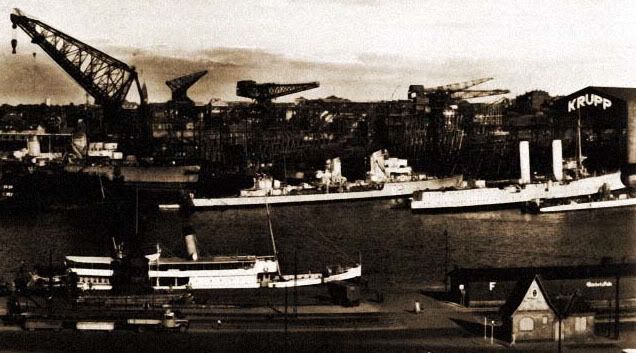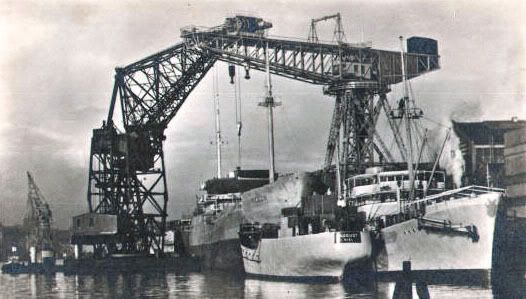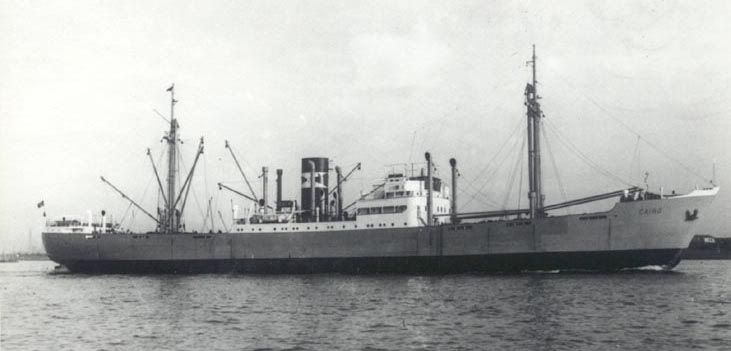Chapter III: Part V
Chapter III: The Lion’s Den
Part V
June 24, 1936
The morning in Kiel was damp and foggy. Hjalmar Schacht shivered as a young naval lieutenant helped him out of his limousine. On the other side of the vehicle, a second officer was opening the door for Gustav Krupp. As Plenipotentiary General for Wehrwirtschaft he had for the past two weeks been touring various industrial facilities throughout Germany, and was thus far quite pleased with the rapid progress he observed. For the last leg of his trip he had been joined by Krupp, the chairman of the Association of German Industrialists and head of the vast manufacturing conglomerate that bore his name. Now Schacht and Krupp, trailing a male secretary, accompanied the two officers up the short steps to the central office building of the Friedrich Krupp Germaniawerft shipyards.
Gustav Krupp von Bohlen und Halbach, Germany’s most powerful industrialist.
In front of the building, they found a knot of men wearing Kriegsmarine greatcoats. At the center, a somewhat smaller man who Schacht recognized as Admiral Raeder was talking rather stiffly with a civilian in an expensive suit.
“Dr. Schacht,” Raeder said, “welcome. Herr Krupp.” The admiral bowed slightly and shook their hands.
Krupp gestured toward the well-groomed civilian standing next to Raeder. “It occurs to me, Dr. Schacht, that you have not met before. May I introduce Herr Cuntz, the director of Germaniawerft Kiel?”
The man so introduced sprang forward and wrung Schacht’s hand. “I am truly pleased, Herr Doctor.” He pressed close and Schacht was overpowered by a musky cologne.
A deep foghorn sounded in the harbor.
Raeder took several steps forward. “Let us begin the tour, with your leave.”
Part of the Germaniawerft facilities, as seen from the west.
The party proceeded along the edge of the large office building and down a flight of concrete steps which led to the paved walkway that overlooked the southern part of the shipyards. Massive steel cranes stood above the quays and dry docks, and Schacht could now hear the incessant plink of a pile-driver somewhere ahead.
Cuntz nodded to him almost reverentially. “These facilities, as per the directive of Point 8 of the Four Year Plan, are being continually enlarged. Across the water, we have begun dredging for a dry dock which will be able to accommodate the construction of warships up to 260 meters in length.”
Germaniawerft Kiel’s shipbuilding facilities began an aggressive expansion program to meet Point 8 of the Four Year Plan, which called for annual tonnage construction equal to the Allies by 1940.
“It is, Dr. Schacht,” Raeder said, “the hope of the Kriegsmarine to obtain approval for several more heavy units before the end of the year. However, I understand that since such ships would not be operational in time to participate in the, ah,
exercises off Denmark, the construction of heavy fleet elements must be postponed in the face of more urgently needed forces.”
“Yes, thank you Admiral Raeder. How do you believe ship production should be directed between now and the invasion?”
“Clearly more troopships and landing craft will be needed, although it may be possible to purchase some vessels from neutral nations. Patrol craft, anti-aircraft barges and minesweepers are also badly needed. Furthermore, it is essential to add at least ten minelayers to the operational list before any attempt to cross the
body of water in question.”
“Fantastic,” Cuntz said gamely, “for you will be delighted to see that undertaking this morning, Herr Admiral. In the water, you shall see the first five of these new minelayers. All five have been recently launched as merchantmen at shipyards around Germany, including one here at Germaniaweft. They have all been appropriated by the Kriegsmarine for conversion to minelayers, which we will carry out over the coming months.”
A brilliant shower of sparks dribbled from the deck of a large merchant ship sitting in the water immediately to the the party’s left.
“What ship is that, Herr Cuntz?” asked Krupp.
“This is the
Kandelfels.
Kandelfels was ordered two years ago by DDG Hansa to be a merchant ship, and constructed at AG Weser Bremen. She was completed only five days ago, before being requisitioned by the Kriegsmarine. The two masts you see,” Cuntz said, directing the party’s attention to the top of the ship, “will soon be taken down by Germaniawerft workers and the cargo areas directly below them specially converted to carry explosive mines. When it is commissioned as
Pelikan, hopefully as soon as August or September, it will be able to deploy more mines in a day than five smaller minelayers.”
The senior Kriegsmarine officers walking behind muttered approvingly.
“The
Pelikan and
Kormoran, which is the green ship under that largest crane, will be the largest minelayers ever built -- each able to carry 610 contact mines. In total, Germaniawerft has so far received five large merchantmen which are to be converted into minelayers.
Cairo,
Ehrenfels,
Kandelfels,
Montevideo and
Porte Alegre -- will become
Albatros,
Kormoran,
Pelikan,
Möwe and
Schwan respectively. Each will undergo significant interior conversions to accommodate large numbers of sea mines; even the smallest,
Cairo, will be able to take on 420 mines. Each vessel will be fitted with two 10.5 cm FlaK cannons, two 6.9 cm rifles for use against small sea targets and five 2 cm rapid-firing FlaK 30 anti-aircraft guns.”
The Porte Alegre
undergoing conversion to the minelayer Schwan.
There were more impressed nods from the officers.
“We have now come alongside the
Pretoria, a troopship which will be able to carry over 8,000 soldiers. Together with its sister ship
Windhoek -- which is under construction at Bremer Vulkan -- they will be able to carry an entire infantry division and its equipment.
Pretoria is just now having internal fixtures installed, and will soon embark on its third test cruise.
“And this,” Cuntz said, hurrying alongside a ship swarming with cranes and dockworkers. “This, this, is the
Cairo. It was constructed right here at Germaniawerft, and so conversion work has already begun. By the end of August, it will be recommissioned as the Kriegsmarine ship
Albatros. Unique among these five minelayers, it will carry a single Heinkel He 60 seaplane for reconnaissance.”
The Cairo
after completion, June, 1936.
“Herr Cuntz,” asked a Fregattenkapitän at the rear of the party, “how many more merchant ships will be converted in this way?”
Cuntz grinned. “Fortunately I know exactly the answer. German shipyards will launch fifty-six merchant ships in 1936, for a combined gross register tonnage of 181,400. Much of that will be needed for actual shipping purposes. However, a friend in the War Ministry has told me that the intention is to convert five more minelayers this year, and twenty in 1937. In that year, merchantman construction is actually projected to
decline, but this is because of the shift to construction of warships and landing craft.”
Schacht turned to Raeder. “Is that not an extremely large number of minelayers?”
The the grizzled admiral drew him forward away from the others. “The operational plan for Löwengrube calls for a speedy and extensive mining of the English Channel before an invasion fleet risks open water. If the main invasion force lands on the south coast in Kent, the Channel will be sealed with mines from Hastings to Dieppe and from Margate to Dunkerque. If the landings are in the north near Ipswich, Clacton-on-Sea to Dunkerque would be mined as well from Great Yarmouth to the Belgian coast.”
Schacht chuckled. “I am afraid I could have been more attentive at my geography lessons. What is the essence of this?”
“The operation calls for sealing the Channel with an extremely dense minefield on both sides of the invasion beaches, wherever they are. This is to prevent British warships from interfering with our operations.”
“Could they not simply use minesweepers to remove them?”
“Yes, this is possible. However it takes them at least twenty times as long to clear a given section of a minefield as it does for us to put it there. For this reason, the Royal Navy would be catastrophically delayed.”
“Do you believe such a strategy will work?”
“There are flaws, certainly, but I
am confident that it is the best chance for a successful invasion given our relative forces. Success will depend upon the minelayers not being sunk, coastal artillery being suppressed and the attainment of complete air superiority. Only one of those factors is to be under my control.”
Insistent throat-clearing behind them turned Schacht’s head to see Cuntz gesturing theatrically in the direction of a giant enclosed dock with huge white lettering:
Germaniawerft. “Within that dock, the pocket battleship
Admiral Graf Spee is having her screws adjusted, boiler lines repaired and electrical systems worked on preparatory to her first war cruise. After extensive trials, a Kriegsmarine friend tells me, it will --”
“Perhaps,” Raeder said glacially, “rather than give Dr. Schacht the second hand account from a naval officer who is clearly lacking in proper discretion, it would be best for the Commander-in-Chief of the Kriegsmarine to explain. The
Admiral Graf Spee, Dr. Schacht, Herr Krupp, is preparing to sail for Wilhelmshaven the long way around Denmark. Kapitän zur See Conrad Patzig, who captained the vessel during its trials, is well-loved by the crew and will retain command. They will hunt British merchantmen trying to brave the Skagerrak going to Sweden or the Baltic. The
Graf Spee will then enter the North Sea and rebase at Wilhelmshaven. Perhaps not the most glamorous war cruise, but it shall give valuable experience to the crew and perhaps result in the capture or sinking of several enemy ships. Furthermore, at Wilhelmshaven it shall join the
Deutschland and the
Admiral Scheer. If necessary the three ships together can be rapidly deployed closer to the zones of conflict.”
Schacht looked intently at the structure enclosing the newborn pocket battleship. “If another total blockade is declared, like in the last war, how could those three ships weigh in the balance?”
“Not very heavily.”
Raeder’s bluntness caught Schacht off-guard.
“Not very heavily at all. This is why I should have liked to put the war off for another ten years, when we could have been on a more even footing with the British. As it is, they have more battleships in their Home Fleet alone than we even have cruisers in the entire Kriegsmarine.”
“Are the British at least -- afraid? Do they feel threatened by the presence of the pocket battleships?”
“To a small degree. If they broke out into the North Atlantic, they could range over most of the world, if Italian refueling stations are counted. Each one could perhaps account for ten ships per month. But it is a very wide ocean, Dr. Schacht. Even three powerful ships are just
three. The British know this, and they do not seem terribly frightened. The loss of any one of them would be a tremendous blow to the morale of the German people. For this reason it is the Führer’s wish that they not be risked yet, which means that a North Atlantic cruise is out of the question.”
252 million Reichsmarks for almost nothing. Sighing, The Wizard drew a notepad and pencil from his coat. Admiral Raeder was doing the best he could with a woefully outgunned navy, but it would take some power beyond him to have a real chance.
Mein Führer, he wrote. Schacht believed he had just the idea to restore to the Kriegsmarine the power it deserved.
After touring the Germaniawerft Kiel facilities, I have come to a single conclusion. Perhaps, the economist in him noted, he could also make this into a financially attractive solution.






